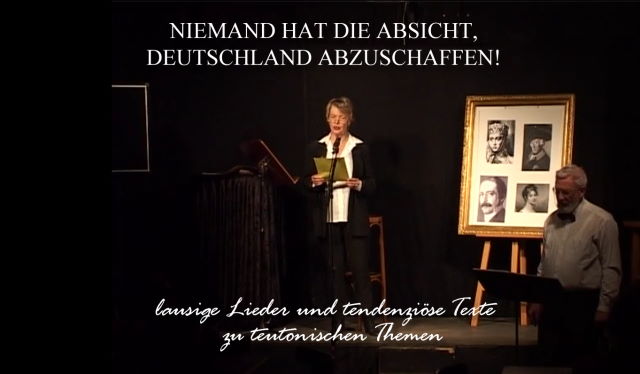-
Since the 1990's the Deutsches Kolleg has called for the Right to Work and the Grounded Right to an inalienable minimum plot of land, and both for each German. The socialist people's revolution and the conservativist people's revolution are thereby part of the core of the Deutsches Kolleg's programme.
-
With the onset of the global crisis in the year 2008, which is beginning as an economic global crisis, one which promises to be far more serious than the economic world crisis from 1929 – 1933, we see the historical moment as having come for us to expand our programme by the liberalist people's revolution.
-
The period from the beginning of the 1980's to 2008 was an epoch of the liberalist class revolution. During this time period the class of the liberals – the possessors of the factor of production, capital – was privileged in every way that it desired. In the era that has now come to its end, the class of the capital possessors has cut the leashes that bound it to the state and broke through the barriers which the state's social political authority of enforcement had thus far imposed.
-
With the loss of these constraints the liberal capitalist class was no longer protected from itself. Its own destructive force and asociality were let loose, in particular against the nationally organised working classes and against the national welfare state, which was increasingly transformed into an anti-national liberalist or capitalist state. This global victory of the liberal class with its revolutionarily unleashed Capitalism blasted the realm of economic usefulness.
-
The age of the neo-liberal class revolution has now definitely come to an end, but only negatively so. The rich can no longer continue as before, and the poor no longer want to put up with it. This characterises the pre-revolutionary situation. The global crisis, which will not leave a single stone of the old order standing – neither economically, nor politically, nor ideologically – can only be positively overcome through a reversal of the liberalist revolution from a mere class revolution to a People's revolution. And this alone would mean that not just globalism, but that capitalism is ended. For the individual fellow German this historical event will manifest itself in the fact that he not only obtains the Right to Work and the Grounded Right (to a minimum immovable property), but that he also obtains an inalienable minimum capital ownership that is measured so that the dividend that accrues to the individual, ensures his livelihood with the amount of income that cannot be expropriated.
-
A People's revolution removes the monopoly that a class of civil society has on one of the three factors of production by distributing this factor in equal parts of value size to each fellow German, and by endowing each person with an equal suffrage in the partner assembly of the production factors. The suffrage can be exercised directly or by proxy. When it is exercised by proxy, the mandate conferred through the suffrage owner must always be imperative. If a People's revolution is concerned with the production factor capital, then it is a liberalist revolution which puts an end to the monopoly of the production means by the capitalist class, and which socialises all means of production in so far as they have taken on the form of monetary and real capital. A factor of production is only socialised in so far as it has been distributed to the single individuals of a People, which – in the form of the particular station – has developed civil society. Since society is only a civil society because it has been subjugated under a national community, the socialised production factor capital (that has been socialised to the individual members of the folk) is at once communalised due to the fact that this sovereign historical deed has been accomplished by a real nation , whose members all belong exclusively to the same People. In this manner capital is therefore civilly socialised and at once nationally communalised. This means, however, that it is not nationalised. For the nationalisation of the capitalist means of production would altogether be their isolation from civil society, and would therefore be neither their classless socialisation, nor their actual communalisation through the civic federation (which encompasses all citizens and their state) within civil society.
-
The liberalist people's revolution, as positive surmounting of the global crisis to which a class' monopoly of the production factor capital has led, will also bring about the people's revolution in the other two factors of production, that are characterised as socialist through the Right to Work and as conservativist through the Grounded Right (to landed property). People's revolutions secure the freedom of each individual by means of inalienable rights (to land, capital and work), while class revolutions promote their class comrades by means of alienable rights, i.e. by facilitating the alienability of their factor goods.
-
A commonweal that is comprised of landowners who work on their land with their own strength and means, and who are thus middle station (since they are able to use their own means of production), may be referred to as conservative, liberal and social. However, the civic-social and parliamentary class opposition of conservatism, liberalism and socialism do not exist in such a commonweal of the middle station. It is not comprised of capitalists and proletarians but out of workers who are in possession of the production means.
-
The dispossessed capitalists will be compensated by a) receiving an inalienable minimum of capital of the same size as that granted to all other free and equal folk members, b) possessing without owning the monetary and real capital of their businesses, which they will be given as fief in order to continue their businesses if the sovereign considers these as desirable for the People's economy, and c) re-socialisation into the folk-community by means of liberating them from the curse of acquiring and consequently exploiting foreign labour.











